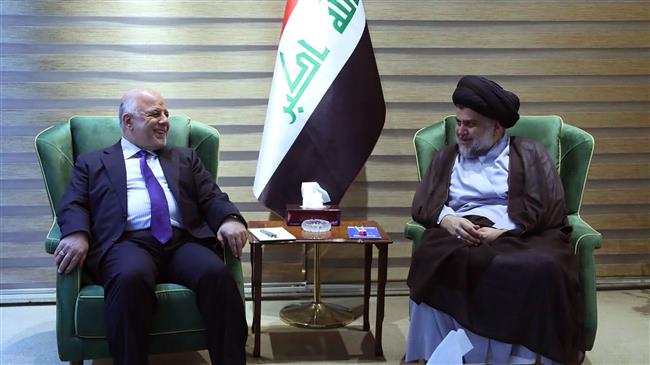
RNA - Sadr and Abadi met in Baghdad on Saturday and held a joint press conference afterwards.
"During our meeting, we agreed to work together and with other parties to expedite the process of forming a new Iraqi government," Abadi said at the briefing.
"It will be a strong government, capable of providing to its citizens services, security and economic prosperity," he added.
The Shia cleric, for his part, hinted at a coalition government, saying, "Our door is open to anyone as long as they want to build the nation, and that it be an Iraqi decision."
Sadr's Sairoon (Marching Towards Reform) bloc won 54 seats in the Iraqi parliament.
The Fatah (Conquest) alliance, led by secretary general of Badr Organization Hadi al-Ameri, and Abadi's Nasr (Victory) coalition finished second and third with 47 and 42 parliamentary seats, respectively.
All the three lists that garnered most of the votes in the May 12 election are predominantly Shia.
Winning the largest number of seats, however, does not automatically guarantee that Sadr will be able to hand-pick a prime minister.
Parties will have to align themselves to try and form a bloc large enough for the parliamentary majority necessary to nominate a candidate.
The government is also required to be formed within 90 days of the official results.
Sadr, a staunch opponent of the US, has campaigned on an anti-corruption platform.
In recent days, he also met with Ammar al-Hakim, whose Hikma Movement came in seventh place, as well as with ambassadors from Iraq's neighboring countries.
According to Press TV, the new Iraqi premier will have to oversee the reconstruction of the war-torn country after defeating the Daesh terror group.
The Takfiri militants unleashed a campaign of death and destruction in Iraq in 2014, overrunning vast swathes in lightning attacks. Iraqi army soldiers and allied fighters then launched operations to eliminate the terror outfit and retake lost territory.
Last December, Abadi declared the end of the anti-Daesh campaign in the Arab country. The group’s remnants, though, keep staging sporadic attacks across Iraq.
847/940